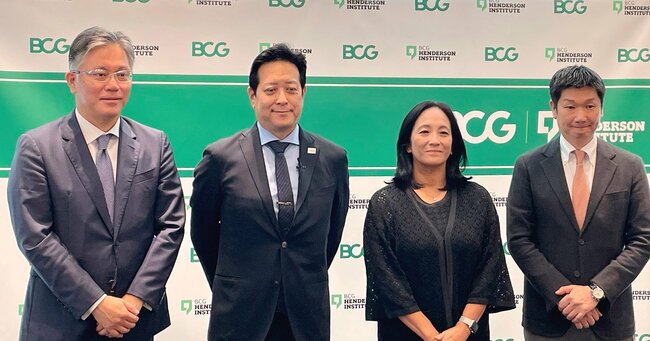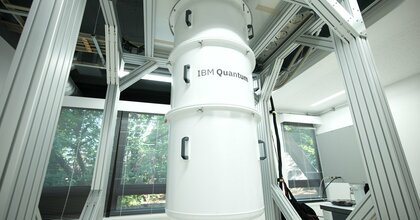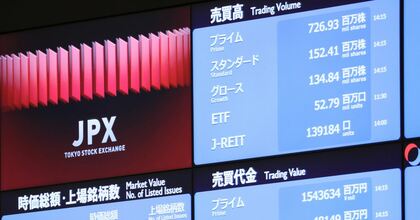Originally published in Japanese on Aug. 24, 2022
Opening shop
On July 20, Boston Consulting Group (BCG) announced that it would create a new facility in Japan for BCG Henderson Institute (BHI), a think tank within the group.
BHI has a relatively short history among think tanks — it was established in 2015 — but its reputation has spread as a part of the famed consulting group. According to a 2020 survey by the University of Pennsylvania, BHI ranks among the top for-profit think tanks and it is well regarded internationally. It mainly focuses on business issues, including technological megatrends and macroeconomic analysis.
The think tank’s researchers, or “fellows,” are a select few who work at BCG offices around the world. Its regional hubs, like the new facility in Japan, conduct wide-ranging research, mainly on regional issues. The Japan office will be BHI’s second such hub after it created one in China.
Why choose Japan, with its stagnant economy? And why strengthen the think-tank business, which is “unprofitable” compared to BCG’s consulting operations?
Japan as a ‘cost center’
BCG will open the new base in Japan in part because the country is “full of problems.”
Japan is at the forefront of major social trends afflicting developed countries: It has a declining birthrate, an aging population, and low levels of happiness. BHI aims to help improve Japanese society through its research and apply the lessons learned elsewhere worldwide.
Japanese members of BCG also played a large role in the decision to set up shop there. “Establishing a hub in Japan was first considered around last summer,” said Osamu Karita, managing director, and senior partner at BCG, as well as the representative of BHI Japan. “Originally, the idea started from a natural gathering of motivated people in small group discussions. From there, the decision was made with the understanding of BCG and BHI.”
BCG entered the Japanese market as early as 1966, and the country has become an important area for the group. In that sense, setting up a BHI hub in Japan is a natural step. It is said that only a few members in Japan are directly conducting research, but the group plans to step up its activity there.
What does the new hub mean for BCG’s business?
Unlike a consulting firm, BHI aims to benefit society with the knowledge it generates. It does not expect to earn income from particular clients. Japan is “clearly a cost center,” said Karita.
It is natural that think tanks would not expect to profit so long as their underlying philosophy is to benefit society through research and “generate social impact,” in the words of Karita. However, BHI’s research can produce three “by-products” that would be of greater use to BCG than direct profits.
By-product benefits
The first of these is a boost to BCG’s reputation.
BHI’s research mostly focuses on business matters, meaning it is also useful for BCG’s consulting business. If the company can present its position as a think tank and demonstrate the quality of its analysis, BCG’s consulting will become more persuasive. BHI’s reputation will bolster that of BCG, attracting more and bigger clients.
The second is employee motivation.
BCG’s slogan is “One BCG, Many Paths,” and the group places a heavy emphasis on the ability of its employees to find satisfaction through various career paths.
The consulting business can face high employee turnover, but BCG can help retain its workers by making available career paths that focus exclusively on research in a group like BHI. These kinds of options also raise employee morale.
BHI has a system in which consultants from BCG are dispatched to the think tank as “ambassadors.” They can devote themselves entirely to research for one-year terms, joining BHI’s fellows. The position is popular within BCG, and dozens of employees are said to be appointed as ambassadors worldwide.
Ambassadors gain broader experience, and their motivations and ability as consultants improve as well.
Finally, BCG’s consulting business will likely grow as knowledge of corporate transformation spreads.
Much of BHI’s research results in recommendations about how to do business better. For example, business resiliency during emergencies has become a topic of discussion, and if a consulting firm releases a report on the importance of reinforcing resilience, its name recognition will grow, and more corporate managers will become alert to the issue.
At that point, more companies will ask consultants about steps to strengthen resilience, including risk assumptions.
One may say this is profiting from a problem of their own design, but BHI’s philosophy is that social transformation cannot come merely through the release of a report; problems must be pursued in combination with changes in corporate behavior. It is thus inevitable that the consulting business makes an appearance at this point.
BHI’s activities are linked to BCG in various ways, meaning the new facility in Japan is not just a branch of the think tank. It will also be significant in growing BCG’s consulting activities in Japan.
A new hub from a major name like BCG could also help to update the image of think tanks in Japan, where they are seen more like organizations tied to financial institutes that provide studies for group companies and public offices when commissioned. In the U.S., however, there are many prominent think tanks that are highly independent and have a major influence on public opinion.
In contrast, Japan is a “think-tank backwater” where there are few high-quality, independent organizations focused on policy, so there is room for think tanks to grow in status.
BHI’s ability will be put to the test in this environment, and it remains to be seen what kind of transformation its new hub will bring to Japan.
(Originally written in Japanese by Akira Yamamoto, translated into English by Erklaren Inc., and edited by Connor Cislo)











